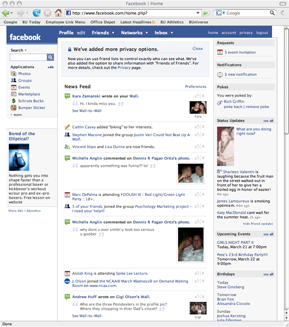Mind Your Facebook Manners
Tips to keep your online profiles work-appropriate

You may have published a blog in high school about your undying love for Justin Timberlake. Now you’re about to graduate, and the last thing you want is a prospective employer reading your gushing tribute to the singer. Facebook is a central part of many college students’ lives, but a few poorly chosen words or photos could harm your chances of being hired.
“You need to be very protective about your personal privacy and how you want to be seen,” says Richard Leger, director of BU’s Office of Career Services. “Realize that any time you put information out there, theoretically it’s out there forever.”
Hiring is a competitive process, and employers want to learn as much as they can about a candidate. Besides reading your cover letter and resume and calling you in for an interview, they will check references and may even perform an online search.
“If employers see things online that make them question the character or seriousness of the individual, that could tip a borderline candidate into the ‘no’ category,” says Leger. “Even if you’re a hot, hot hire, having inappropriate material on Facebook could mean a lower salary.”
So how do you protect your reputation online?
- Start by Googling yourself and see what comes up. Ask yourself whether the information would raise a red flag to a future employer.
- Remove inappropriate photos or information, such as references to drinking or drug use. And remember, you may not have written everything on your Facebook wall, but you’re still accountable for what others write about you.
- Block your profile so that only your selected “friends” can see it. (To do so, click on “Privacy” at the top of your Facebook home page and you’ll have the ability to change your privacy settings). If you belong to the Boston network and don’t block your profile to your friends list, any member of the public network (almost 400,000 people) can see it.
- Consider whom you want to be your “friend.” Don’t befriend your boss if you don’t want to give him or her access to your profile.
- Make sure your e-mail address is appropriate; HotChick71 isn’t the image you want to project. Leger suggests using your BU address or one that has a neutral or professional appearance.
Facebook has been criticized for being too public with its users’ information — advertising when a user has posted pictures, joined a group, or made an online purchase, for example. Last week, the site announced it is introducing new privacy controls that will enable users to distinguish among friends, family, and coworkers in their “friends” list.
But it’s wise not to depend on those controls and instead just play it safe. “In a public service like a Facebook, you want to give off a conservative demeanor to potential employers,” Leger says. “I would just be very careful of anything I sent out online, whether it be through e-mail or applications like Facebook.”
Amy Laskowski can be reached at amlaskow@bu.edu.

Comments & Discussion
Boston University moderates comments to facilitate an informed, substantive, civil conversation. Abusive, profane, self-promotional, misleading, incoherent or off-topic comments will be rejected. Moderators are staffed during regular business hours (EST) and can only accept comments written in English. Statistics or facts must include a citation or a link to the citation.